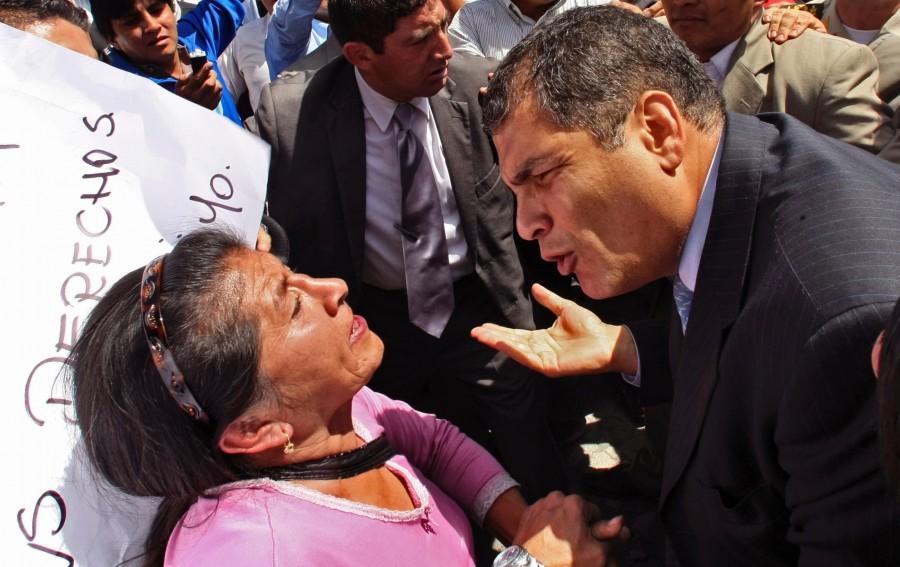QUITO, Ecuador (AP) — Hundreds of police protesting a new law that cuts their benefits plunged this small South American nation into chaos on Thursday, shutting down airports and blocking highways in a nationwide strike.
There were no reports of serious violence against the government, but President Rafael Correa was hospitalized due to the effects of tear gas after being shouted down and pelted with water as he tried to speak with a group of police protesters.
“If you want to kill the president, here he is! Kill me!” said Correa, refusing to back down.
Speaking by telephone from a hospital room where he said he was hooked to an intravenous drip to help him recover, Correa described the unrest as “as an attempted coup by the opposition” and said “history will judge them.”
“I call on patriotic police to submit” to his leadership, Correa added.
The protest appeared to have arisen spontaneously, literally overnight, and there was no immediate evidence that the opposition was involved.
The rebellious officers fired tear gas and burned tires after taking over barracks in Quito, Guayaquil and other cities. They also set up roadblocks that cut off highway access to the capital.
Schools shut down in Quito and many businesses closed due to the absence of police protection that left citizens and businesses vulnerable to crime.
Looting was reported in the capital — where at least two banks were sacked — and in the coastal city Guayaquil. That city’s main newspaper, El Universo, reported assaults on supermarkets and robberies due to the absence of police.
The U.S. Embassy issued a message warning U.S. citizens “of a “nationwide strike by all levels of police, including military police.” It warned them to “stay in their homes or current location, if safe.”
There were no reports of serious violence against the government, but President Rafael Correa was shouted down and pelted with water as he tried to speak with a group of police protesters.
“If you want to kill the president, here he is! Kill me!” said Correa, refusing the back down.
The Quito newspaper La Hora quoted the armed forces chief, Luiz Gonzalez, as saying that the military was loyal to Correa. However the National Assembly building was occupied by striking police.
The striking police were angered by a law passed by Congress on Wednesday that would end the practice of giving members of Ecuador’s military and police medals and bonuses with each promotion. It would also extend from 5 to 7 years the usual period required for before a subsequent promotion.
“They are a bunch of ungrateful bandits,” Correa said of the protesters. “No one has supported the police as much as this government,” he told reporters.
The law needs to be published before it takes effect and that has not happened.
Air force troops shut down the Quito’s Mariscal Sucre airport as the protests commenced Thursday morning. An airport official who refused to give her name said its “operations have been suspended.”
The airport’s president, Philippe Baril, told a local radio station that 300 troops had occupied runways, forcing flight cancelations. About 700 passengers were stranded, he said.
The U.S. Embassy said Guayaquil’s airport was also closed.
Dozens of Correa supporters marched toward the city center to support him.
Traditionally unstable politically, this nation of 14 million has seen relative peace and stability since Correa, a U.S.-trained economist allied with Venezuela’s President Hugo Chavez, took office in January 2007.
Copyright 2010 The Associated Press.








